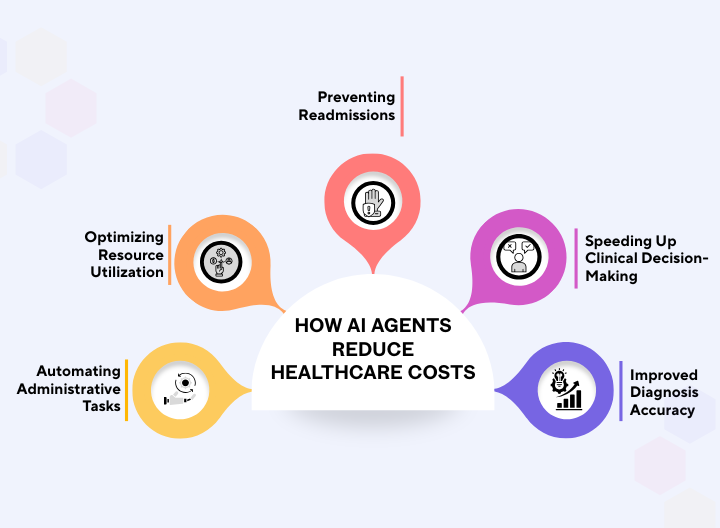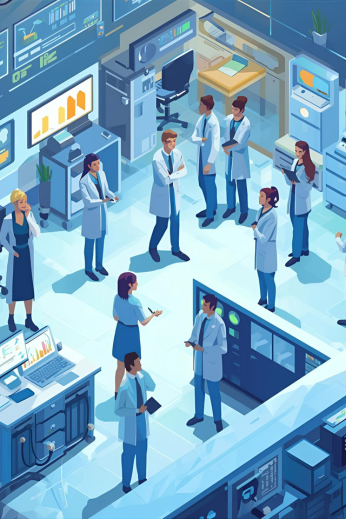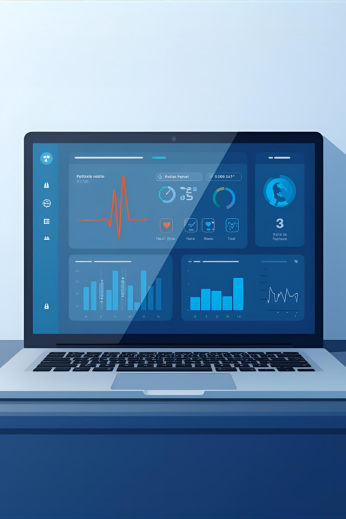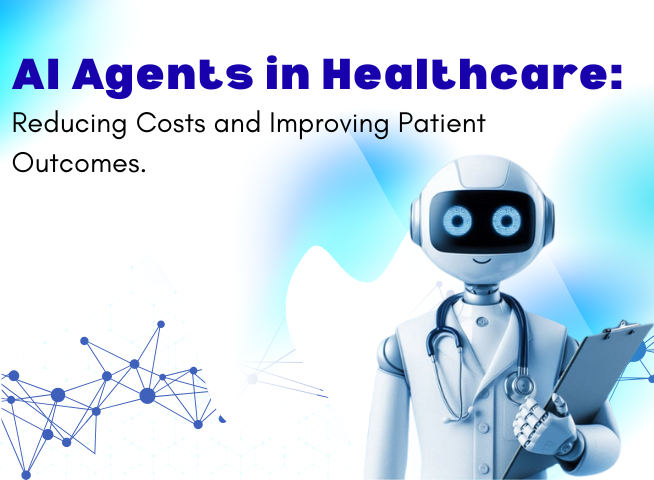The healthcare industry is under immense pressure. Rising operational costs, staff shortages, and an ever-increasing demand for high-quality care have made it clear that traditional healthcare procedures are not sustainable.
To survive and thrive in this new era, healthcare providers must look toward smarter, technology-driven solutions.
One innovation leading the charge is AI agents, an intelligent digital assistant that do not just automate tasks, but also learn, adapt, and support doctors, nurses, administrators, and patients.
From reducing healthcare costs to improving patient outcomes, AI agents are shaping the future of healthcare delivery.
What Are AI Agents in Healthcare?
AI agents are intelligent software systems that are designed to assist, automate, and enhance various aspects of healthcare. They combine machine learning, natural language processing (NLP), computer vision, predictive analytics, and automation to support healthcare professionals.
In healthcare, AI agents can:
- Communicate with patients via chat or voice.
- Analyze patient data to detect health risks.
- Automate repetitive back-office tasks like billing and scheduling.
- Support clinical decision-making by providing insights.
- Accelerate drug development process by optimizing clinical trials.
- Offer continuous remote monitoring and telemedicine.
- Summarize and extract valuable information from medical data.
AI agents use artificial intelligence techniques to make decisions and take actions to achieve goals. They adapt, learn from patterns, and improve over time. Think of them as virtual colleagues who can take on routine workloads so healthcare professionals can focus on critical, high-value tasks.
Why Healthcare Costs Keep Rising
Before we look at how AI agents help, let us understand the challenge.
Healthcare costs are rising due to several factors:
- Administrative overload – Around 30% of U.S. healthcare spending goes into administrative processes like claims, billing, and paperwork.
- Workforce shortages – Hospitals and clinics worldwide are facing a shortage of doctors, nurses, and support staff.
- Chronic disease management – Diabetes, cardiovascular diseases, and cancer require continuous monitoring, making treatment expensive.
- Inefficient resource utilization – From unoccupied beds to redundant tests, inefficiencies drive up costs.
- Medical errors – Mistakes in diagnosis, prescriptions, or procedures lead to financial and human costs.
AI agents address these pain points directly by cutting inefficiencies, reducing errors, and ensuring better allocation of resources.
How AI Agents Reduce Healthcare Costs

Benefits of AI Agents and their significant impact are seen across various sectors of healthcare industry.
1. Automating Administrative Tasks
Administrative work eats up both time and money. AI agents can manage:
- Appointment booking and rescheduling.
- Insurance verification and claims processing.
- Billing and payment reminders.
By reducing manual workloads, healthcare organizations save on staffing costs and minimize costly human errors.
2. Optimizing Resource Utilization
Hospitals often struggle with capacity planning. AI agents use predictive analytics to:
- Forecast patient admission rates.
- Manage bed occupancy efficiently.
- Track and schedule use of critical equipment.
This ensures no resource goes underutilized while avoiding overbooking or shortages.
3. Preventing Readmissions
Hospital readmissions are costly and often avoidable. AI agents help by:
- Monitoring discharged patients remotely.
- Sending medication and appointment reminders.
- Alerting providers if a patient’s condition worsens.
This proactive approach reduces unnecessary hospital stays and saves significant costs.
4. Speeding Up Clinical Decision-Making
Doctors are often burdened with large amounts of patient data. AI agents can:
- Aggregate lab results, imaging reports, and EHR data.
- Highlight risk factors or anomalies.
- Suggest treatment options based on similar cases.
This accelerates decision-making and prevents unnecessary diagnostic tests.
5. Improved Diagnosis Accuracy
Healthcare systems generate a vast amount of diverse and complex data. AI agents can:
- Design personalized treatment plan.
- Provide data-driven insights for healthcare management.
- Integrate genetic data for effective treatment.
This reduces the likelihood of costly diagnostics errors leading to accurate treatment.
How AI Agents Improve Patient Outcomes
AI agents enhance the quality of patient care.
1. Personalized Patient Care
Every patient is unique. AI agents analyze patient history, lifestyle, and genetic factors to:
- Provide tailored treatment plans.
- Offer lifestyle recommendations.
- Adjust care plans dynamically as new data comes in.
This ensures that patients receive individualized care, not one-size-fits-all solutions.
2. 24/7 Virtual Health Assistance
Imagine a patient feeling unwell at midnight. Instead of waiting for clinic hours, AI-powered chatbots and voice assistants can:
- Answer medical queries.
- Guide patients on whether to seek urgent care or manage symptoms at home.
- Provide emotional reassurance.
This round-the-clock availability improves patient satisfaction and reduces unnecessary ER visits.
3. Remote Patient Monitoring (RPM)
Wearables and IoT devices paired with AI agents allow real-time health monitoring. For example:
- A diabetic patient’s glucose levels can be tracked continuously.
- Cardiac patients can have heart rate and ECG monitored remotely.
- Alerts are sent instantly to caregivers in case of anomalies.
This improves outcomes by ensuring early intervention.
4. Reducing Medical Errors
AI agents act as a second set of eyes for healthcare professionals by:
- Cross-checking prescriptions to avoid harmful drug interactions.
- Flagging inconsistent diagnoses.
- Ensuring adherence to treatment protocols.
With fewer errors, patient safety and trust in healthcare systems improve significantly.
5. Streamline Hospital Operations
AI agents can optimize hospital resources (e.g., beds, staff, medicine, equipment) based on real time data.
- Predictive models can forecast patient inflow.
- Efficient resource allocation to avoid bottlenecks.
- Automating administrative tasks to improve operational efficiency.
This makes healthcare more efficient, personalized, and accessible.
Real-World Examples of AI Agents in Healthcare


- Mayo Clinic: Uses AI-powered scheduling systems to reduce wait times and improve staff efficiency.
- Babylon Health: Offers an AI chatbot that triages symptoms and directs patients to the appropriate care level.
- Philips Healthcare: Employs AI-driven remote monitoring to support chronic disease management.
- Johns Hopkins: Leverages AI tools for predicting patient deterioration in ICUs.
- Morgan Health: Uses AI to analyze claims and benefits data to improve health program performance.
These examples showcase how AI agents are playing a vital role in healthcare industry.
Challenges to Overcome
Despite their promise, AI agents in healthcare face hurdles:
- Data Privacy and Security
Handling patient data requires strict compliance with HIPAA and GDPR regulations.
- Integration with Legacy Systems
Many hospitals use outdated IT systems, making integration a challenge.
- Patient Trust
Some patients feel uneasy about receiving recommendations from AI instead of doctors. - Cost of Implementation
Deploying AI systems requires upfront investment, though long-term ROI is positive. - Bias and Fairness
AI models can inherit and even amplify existing biases in training data. - Lack of Explainability
Many AI systems (especially deep learning models) do not provide transparent reasoning behind decisions.
Addressing these concerns requires careful planning, training, and transparent communication with patients and staff.
The Future of AI Agents in Healthcare
The future of healthcare is smarter, faster, and more personalized. Here is what to expect:
- Virtual Nursing Assistants – AI agents will guide patients throughout recovery, reminding them of medication schedules and physical therapy exercises.
- Surgeries – Clinical teams will use AI agents during surgeries.
- Early Disease Detection – By analyzing subtle patterns in health data, AI agents may spot diseases before symptoms even appear.
- Public Health Surveillance – AI agents will help track and manage diseases at community and global level.
- Consumer Tech – AI agents will increasingly live in smartphones, wearables and home devices becoming part of daily life.
- Fully Integrated EHR Systems – Doctors will receive real-time recommendations as AI agents analyze medical records instantly.
- Scalable Telemedicine Support – AI agents will make remote healthcare more accessible and affordable, especially in underserved regions.
The next decade AI agents will become a critical force behind every diagnosis, treatment, and patient interaction.
Final Thoughts
AI agents are already reshaping the future of healthcare not as replacements for healthcare professionals, but as a powerful ally that enhances the efficiency, precision, and reach of medical services.
By cutting down on unnecessary costs and enhancing patient care, they provide a much-needed solution for industry, under immense strain.
AI agents will make healthcare providers more effective, more informed, and more empowered.
The organizations that embrace AI agents thoughtfully and responsibly will provide healthcare that is efficient, affordable, and patient-centered.




